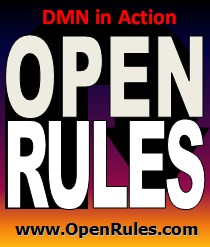Open Your Business Rules!
Rules-based
Operational Decision Services
Release 5.0.0
OpenRules 5.0 adds Rules Templates essentially simplifying Rules Repositories Management
EDISON, NJ -- March 29, 2008 -- OpenRules, Inc. announced today the availability of a new major release OpenRules-5.By introducing new Rule Templates OpenRules Release 5.0 essentially simplifies rules repository construction and management and expedites initialization of the OpenRulesEngine. Rule Templates allow a rule designer to completely hide implementation details from business analysts and reuse them without copying.
"The latest OpenRules advances allow us to dramatically minimize the size of our rules repository. Rule templates become a blessing for our complex patent processing rules that have to support data streams from more than 80 different countries," said Rex Bosma, a project manager at European Patent Office (EPO) where OpenRules-5 has been already applied.
While the new rules templatization mechanism is simple and intuitive it brings enormous advantages from the business rules management perspective:
- Write
once use many times
- Write rules for one state or country and then use them as a template for all other states/countries
- Changes in the implementation of a rule template are automatically propagated to all rule tables that extend this template
- Complete
separation of business and technical views
- Business people have less to learn (and to be afraid of)
- Technical people have more freedom in rule templates design and maintenance not being afraid to scare their business counterparts by complexity of rules implementation logic
- By placing rule templates
and rule tables in separate files you may
essentially simplify authorization control and
who-does-what assignments
-
Rules repository becomes smaller and easy to maintain
- Templates allow to avoid a "paste-copy" approach by minimizing the total amount of code and the size of rule tables
- While preserving the same
structure changes in the templates and rules could
be done independently
-
Expedited
initialization of OpenRulesEngine
- Use of rule templates not only minimizes the total size of rule repositories but contain much less code to be interpreted when OpenRulesEngine downloads all rules for the first time
- Based on the size and design of
the existing rules repositories the gain in the
initialization time could vary from 2 to 5 times
- Libraries of
rule templates specific for different lines of business
- An ability to create OpenRules template libraries may allow leading organizations in different industries to implement already established business standards such as ACORD for insurances or MISMO for mortgages as a set of Excel-based templates. Even if the library implementers prefers to use their own business models initially they always may change the templates implementation later on without changing the business rules themselves
- A similar model will work well
for OpenRules OEMs who may define and maintain their
rule template libraries in accordance with their
latest business object models
-
Non-intrusive
approach
- Rule templates are regular rule tables that were always used in OpenRules repositories. They may include concrete rules and be executed as usual
- All rules repositories created before OpenRules-5 will continue to work without problems (just a little bit more efficiently)
The release Note for OpenRules 5.0 could be found here. OpenRules 5.0 includes a sample project "HelloJavaTemplates" that demonstrate the use of new features. The web site www.openrules.com as well as the online User's Guide have been modified to reflect the changes introduced by OpenRules-5.
About OpenRules
OpenRules, Inc. is
a NJ-based corporation that develops, supports and provides
consulting services around Open Source Business Rule Engine
commonly known as OpenRules™. For details, please visit
http://www.openrules.com.
Java is a trademark of Sum Microsystems, Inc.
OpenRules is a trademark of OpenRules, Inc. All other
trademarks are the properties of their respective owners.

